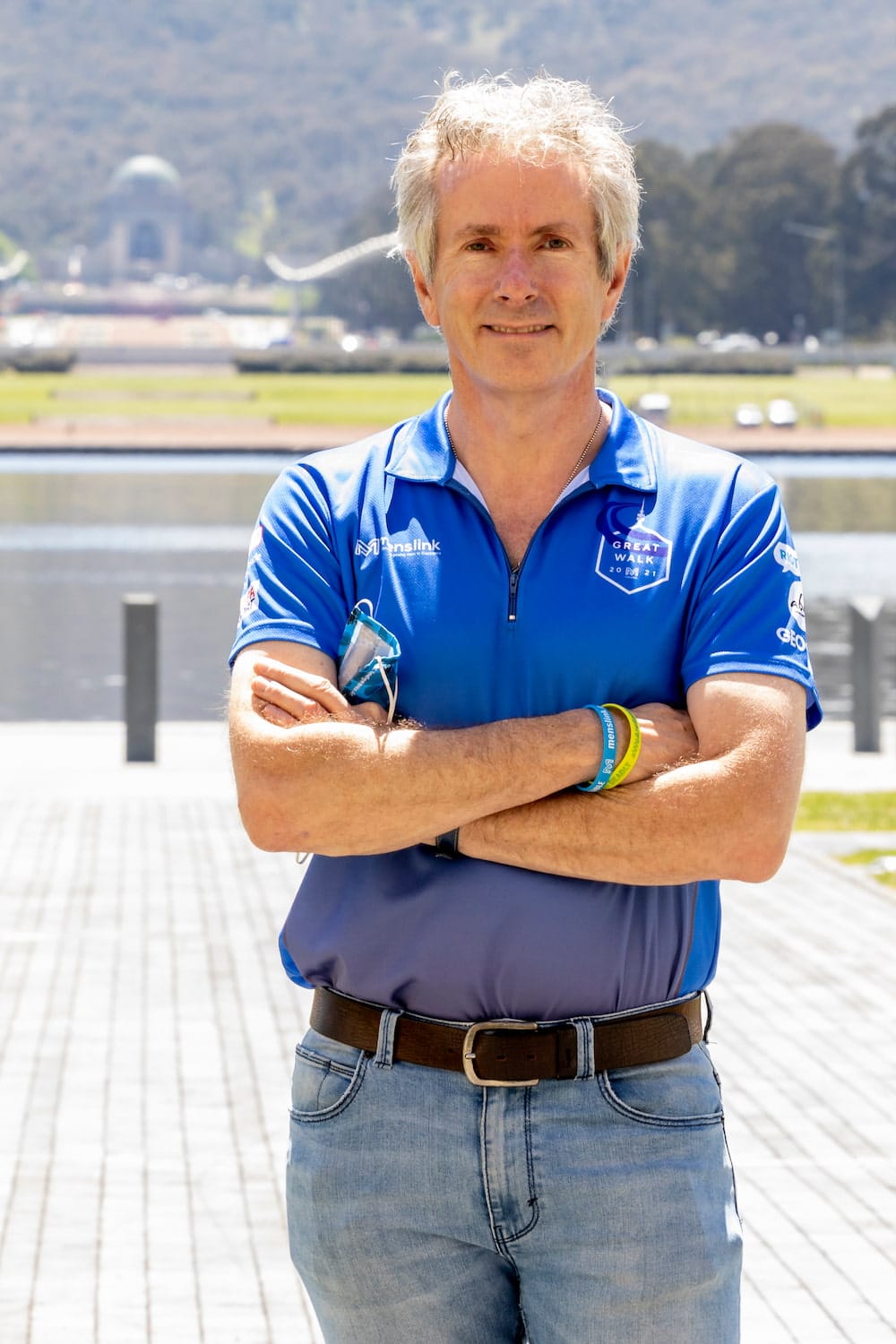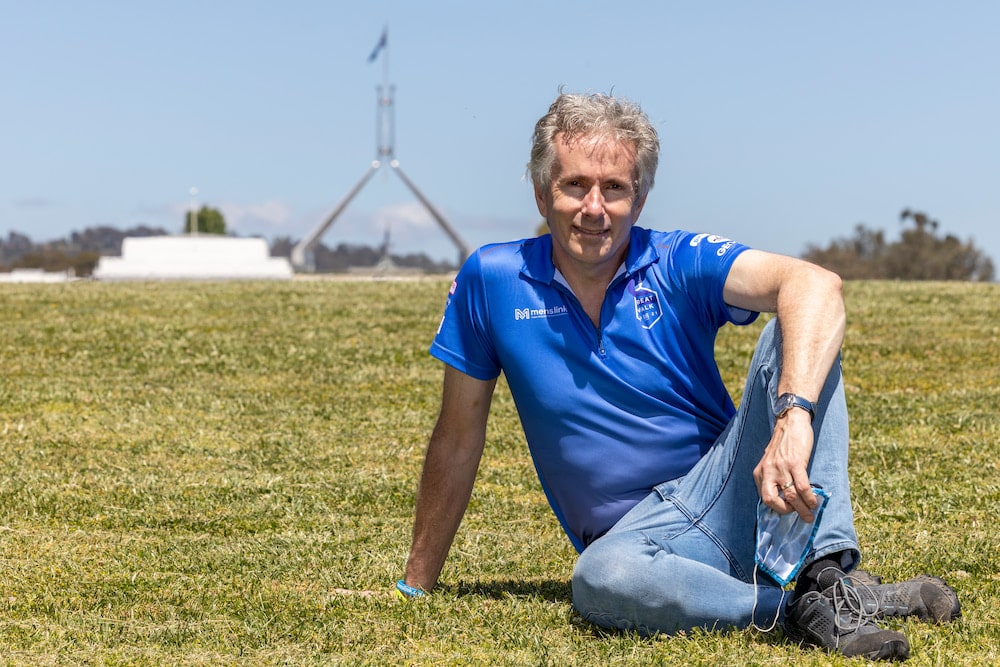Menslink’s former CEO, Martin Fisk OAM, left the mental health organisation for young guys last month, but the good work he and his staff and volunteers achieved still thrills him.
Earlier this month, he went to the wedding of a man whom Menslink helped through some difficult times.
“Both his parents had died early, and he’s come through,” Mr Fisk reflected. “My wife and I have the privilege of being able to go to [the wedding] and celebrate with him and his lovely fiancée. It’s only a little thing, but it’s pretty cool to be able to see this young man who’s had some significant challenges come through with absolutely flying colours.”
In his 11 years at the helm, Mr Fisk and his dedicated staff and volunteers helped thousands of young men turn their lives around – which he considers an incredible honour and privilege.
He estimates that Menslink has spoken to every young guy under 30 in Canberra, whether through free counselling (for 10- to 25-year-olds), its youth mentoring program (for 10- to 16-year-olds), or simply visits to schools.
“I think it’s made a difference to our entire society with young guys who go: Do you know what, before I disappear into my own shell, before I lash out in anger and hit somebody in the street or in my own family, before I go down a drugs or alcohol path, or even suicide, maybe I’ll just talk to somebody about stuff that’s bothering me, and I’ll be less embarrassed about it.”
- Menslink’s Great Walk: Building resilience for Canberra’s young guys (28 October 2021)
Menslink’s clients come from every walk of life: all socio-economic strands, all abilities and disabilities, and all cultural backgrounds, Mr Fisk said.
“There are no identifying trends about why somebody would go through tough times. We deal with young men who have been or are homeless through to some very well-to-do people, but they all struggle in their way. If we can help them a little bit on their life journey, if we can make it less painful, if we can help them on a better path, we do.”
Some young men only need a couple of visits; Menslink has supported others for years. The organisation has turned people around from drug use or suicide – but the work can be emotionally gruelling.
“I have pretty much come across every crime, every level of challenge, and it can break your heart sometimes,” Mr Fisk said.
“In my career, I’ve been to more suicide funerals than I think anybody should ever go to in their life. To go to the funeral of somebody who’s only 19, that’s really tough.”
- Menslink provides long-term benefits: study (18 October 2018)
Young people on the streets stop him to tell him that a Menslink worker – Michael or Cookie or Des or Dave – talking to their school helped them. Mothers tell him that their son disclosed something they were struggling with at school.
“Bullying, for example, is very common, but they didn’t feel they could put up their hand and ask for help, until we helped them realise it’s okay to,” Mr Fisk said.
One Father’s Day, a young man he had supported for many years rang him, and said: “Marty, I just thought you’d appreciate a call on Father’s Day, just to say thank you for all the work you’ve done.”
“That just made my day,” Mr Fisk said.

He became involved with Menslink when he left the public service at the end of 2010. Wanting to work with the community, and hearing that Menslink was looking for a CEO, he met his predecessor, Glenn Cullen, for what was meant to be a 20-minute coffee.
“Two and a half hours later, I was sold! It was just such a fantastic opportunity. I’d always thought that if Menslink or something like it was around when I was a teenager, would my life’s journey have been a bit easier? Would my life’s journey have been less painful? I just went into that job heart and soul, and it’s just been a wonderful opportunity and experience since then.”
When he was young, Mr Fisk remembered, he had some mental health issues, compounded by loneliness and self-medication.
“In those days, mental illness was a dirty word. You didn’t talk to anybody; there wasn’t anybody to talk to; so you compounded the illness, and you isolated. That put me in some really, really dark spots. I wonder if I’d had the opportunity of mentoring or free and confidential counselling, or if I’d had people come out to my school and talk about mental health issues, talk about how to get through tough times, that might have made all the difference.
“Now, I don’t regret my life. Clearly, my life experience has brought me to where I am today. But that really gave me the passion for the work I do.”
Last year, that passion was recognised when he received the Medal of the Order of Australia “for service to the community through social welfare organisations”.
“As I said at the time, if it was up to me, the OAM would stand for Order of All of Menslink, because at the end of the day, I was one individual. There are lots of people who have fundamentally contributed to the success of Menslink and the successful outcomes for young guys. So, not just me. I’ve been an important piece, but just a piece in that overall puzzle.”
- Canberrans recognised in Australia Day honours (26 January 2022)
The other pieces are the community he has assembled around a common cause: the “massively dedicated and wonderful” staff; the even bigger pool of volunteers, “all of whom are doing their very best to help young guys and their families”; government donors and business sponsors.
And sportsmen. In 2014, the Canberra Raiders helped Mr Fisk launch the Silence is Deadly campaign, a school program that encouraged young men to get help with problems in their lives – from friends, an adult mentor, or professional help – rather than suffering in silence.
“So many young guys weren’t getting help because they felt embarrassed; they felt that they should be the problem solvers themselves, not have problems themselves,” Mr Fisk said. “The Raiders were on board like that.” He snaps his fingers.
The one-hour session has been held in schools throughout Canberra, Queanbeyan, and Yass for the last decade, reaching between 5,000 and 10,000 schoolboys every year.
Another program, Pride, helps them to become self-aware, cultivate constructive personal behaviours, and eliminate destructive ones.
“Giving some of these young guys some life lessons in our school programs … is massively important because often life skills are not something that you’re going to find in a maths, English, or science class,” Mr Fisk said.
But girls also need help. In 2020, Mr Fisk established Menslink’s sister organisation, Fearless Women, which helps young women suffering anxiety – the biggest mental health issue facing the majority of young women, he explained; in fact, the ACT has higher levels of anxiety among young women than other Australian states and territories.
“We started really ramping up Menslink because there was a need amongst young guys, but what we found is that there was also quite a hidden need amongst young girls,” he said. “Fearless Women is up and running today, kicking great goals for young girls in the community.”
But all good things come to an end. Long service last year gave Mr Fisk time to reflect. He knew that he intended to retire in 10 years – running Menslink in 2033, after 22 years at the helm, would not be the best thing for the organisation or for himself – and he realised that the best and least disruptive time to leave was now.
“Menslink’s doing very well without me; we’ve got a fantastic general manager acting CEO in Penny Burns; and from a day-to-day perspective, it’s just like I don’t come back.”
Now, Mr Fisk is looking for another job, in the public, private, or community sector.
“I want to do something where I can make the most impact on this wonderful community we have here in Canberra,” he said.
Cantlie Recruitment advertised the job for Mr Fisk’s successor last week.
“I look forward to seeing who that is – and if they would like my support, then of course it will be there,” he said.
Whoever leads Menslink on its journey over the next 20 years, Mr Fisk reflects, will have a lot of work ahead of them: social media and the environment cause more mental health issues than ever before.
“The workload is higher, but [Menslink] is in solid shape, and Menslink will continue to do amazing work over the next 20 years, and hopefully 40 years.
“It’s such a great organisation – and the staff, the volunteers, the board of directors, the business sponsors, and the donors are also great. I think the new CEO will quickly be able to get up and running, and do amazing things.”
Young guys who are struggling, and want free and accessible face-to-face support that has no capped limits on how many times they can access that support, can contact Menslink via their online help form.
For urgent help, contact:
- Kids Helpline: phone: 1800 55 1800; online: www.kidshelpline.com.au
- Lifeline: phone: 13 11 14; online: www.lifelinecanberra.org.au
- Beyond Blue: phone: 1300 22 4636; online: www.beyondblue.org.au



